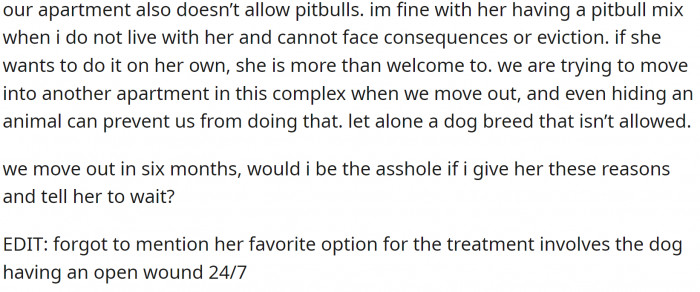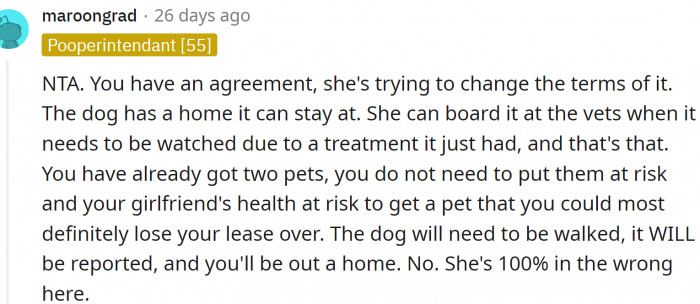Young Woman Says No To Her Roommate’s Irrational Request To Bring A Dog Into A Home Where Two Cats And An Allergic Person Live
Roommates are a sort of lottery. You can end up with a great one, but you can also be in for quite a ride. Even when your roommate is perfectly fine, there are still situations that can lead to misunderstandings and conflicts.
We are all different and have varying desires and priorities. For instance, some people prefer cats, while others like dogs.
This can be quite a problem when these individuals live together, just like our OP today. She is a 20-year-old woman living with her girlfriend and roommate.
The three of them, along with their two cats, have gotten along just fine until the roommate decided she wanted to bring in a family dog. OP says:
“My girlfriend and I have two cats. Our lease ends in spring, and my girlfriend and I are planning to move out. V wants to take in her family’s dog, and since we don’t know if he is cat-friendly or not, she is waiting until we move out. Our apartment only allows two pets, so she gave us her spot for the second pet, and we got the second cat.”
Now, it is very likely that V believes OP and her girlfriend owe her something, and she is not shy about wanting a favor in return.
“My roommate recently got a job at a vet hospital, and she gets a huge discount on ‘emergency treatments.’ V approached my girlfriend today and told her that V wants to take in her family’s dog and put him through treatment.”
“Her dog has had problems in the past, but he had it removed over a year ago, and nothing new has popped up. He is 9 years old and is a Pitbull mix, so he’ll likely live maybe three more years.”
However, there are many problems with the plan she has forged. Read this interesting story below:
OP asks:

OP lives with her girlfriend and a roommate. They also have two cats

The roommate now wants to take in a family dog

Understanding the Dynamics of Shared Living Spaces
The situation described highlights essential principles of boundary setting and emotional safety in shared living environments. According to Dr. Terri Orbuch, a relationship researcher, "Clear communication about expectations is crucial for cohabitation success." Each roommate brings their own history and emotional baggage into these spaces, which can complicate interactions. When one individual feels overwhelmed by the prospect of caring for additional pets, it often reflects deeper concerns about their autonomy and emotional well-being, as noted by Dr. William Doherty, a family therapist who emphasizes the importance of understanding personal limits in shared living situations.
Understanding the Dynamics of Roommate Relationships
Interpersonal dynamics in shared living situations can often reveal deeper psychological patterns. When one roommate makes a request that seems irrational to another, it often highlights underlying issues such as communication styles and attachment needs.
According to Dr. Amy Cuddy from Harvard Business School, these situations can evoke feelings of vulnerability and defensiveness, particularly when they touch upon personal values and boundaries. This can lead to a breakdown in effective communication and exacerbate conflicts.
And she works all day long

There are also other problems

OP lists several of them. And these are all valid concerns

Psychologists emphasize that the presence of pets can alter the dynamics of a living situation, particularly when allergies or pre-existing pet relationships are involved. The stress of introducing a new pet into a home where other animals and an allergic person reside can evoke anxiety and resistance. Research in animal behavior suggests that introducing new pets should be carefully managed to ensure the well-being of all animals involved, as well as the humans.
The request to bring a dog into a home already occupied by two cats and an allergic person is a classic example of a lack of empathy in decision-making. Research published in the Journal of Personality and Social Psychology highlights that individuals often struggle to consider how their actions might affect others, particularly in emotionally charged situations.
This can stem from a self-centered cognitive bias, where one’s perspective dominates their awareness, leading to conflict. It's crucial in these scenarios for both parties to engage in open dialogue about their needs and constraints.
OP asks if she is wrong here

Redditors agree: NTA

Her reasons are valid

The Importance of Negotiation Skills
Effective negotiation is a critical skill in shared living arrangements. When discussing the introduction of a dog into a home with existing pets and allergies, it’s crucial to consider all parties' feelings and perspectives. Studies show that collaborative problem-solving can lead to more satisfactory agreements. Techniques such as active listening and empathetic communication can help roommates express their needs while also considering the other's concerns.
What Research Shows About Conflict Resolution
Studies indicate that conflicts in shared living environments often arise from unmet needs or expectations. According to Dr. John Gottman, a renowned marriage researcher, "Effective communication is the cornerstone of resolving conflicts, and it involves understanding each other's perspectives." Successful conflict resolution hinges on effective communication strategies, including active listening and assertiveness. Moreover, understanding each person's underlying motivations can facilitate more constructive conversations. For instance, the roommate may feel lonely or insecure, prompting her to seek companionship through a pet, while the other may prioritize maintaining a peaceful home environment, as noted by Dr. Sue Johnson, a pioneer in couples therapy, who states, "Recognizing emotional needs can lead to healthier interactions and solutions."
The roommate should wait until OP moves out

It would be a stressful situation

It is a major change

From a behavioral standpoint, the resistance to the roommate's request may stem from a fear of losing control or having to take on additional responsibilities. Research in behavioral psychology indicates that individuals often respond negatively to perceived threats to their autonomy. In this case, the young woman’s refusal to accept the dog could be a protective measure to maintain her sense of agency in her living space.
To navigate such conflicts, psychologists often recommend establishing clear boundaries and agreements upfront. This includes discussing pet responsibilities, allergies, and the emotional implications of bringing a new animal into the home.
Engaging in collaborative problem-solving can help roommates feel heard and respected, thereby enhancing their overall relational dynamics. Research indicates that when people feel validated, they are more likely to compromise and find mutually agreeable solutions.
The roommate is seriously overstepping boundaries

The dog has needs that will fall on their shoulders

The roommate can board the dog at the vet when it needs to be watched due to a treatment it just had, and that's that. OP already has two pets, and she does not need to put them and her girlfriend’s health at risk.
The dog will need to be walked, it will probably be reported, and OP will lose her apartment and the possibility of getting another in the same building. It's a really tight spot she is in, and we hope they will find a solution.
The Importance of Empathy in Shared Living Spaces
Empathy plays a crucial role in maintaining harmony in shared living situations. Neuroscience research shows that empathy can actually enhance cooperative behavior and reduce conflicts.
For example, studies have found that when individuals engage in perspective-taking—actively considering the feelings and viewpoints of others—they're more likely to find common ground. This is particularly important in roommate scenarios where differing lifestyles and preferences can clash.
Psychological Analysis
This situation highlights the importance of emotional intelligence in shared living environments. When one party's needs overshadow those of others, it can lead to significant interpersonal strain. Encouraging open dialogues about personal boundaries and emotional needs is essential for fostering a respectful and harmonious living space.
Analysis generated by AI
Analysis & Alternative Approaches
In summary, the dynamics of roommate relationships often reveal intricate psychological patterns that can be navigated through improved communication and empathy. Research consistently shows that fostering an atmosphere of mutual respect and understanding is key to resolving conflicts.
As noted by numerous studies, approaching disagreements with a mindset geared towards collaboration rather than confrontation can lead to more positive outcomes for all involved.
Building Healthy Roommate Relationships
To foster a respectful and harmonious living arrangement, both parties should engage in open dialogues about their concerns. Establishing house rules regarding pets and responsibilities can mitigate conflict. Furthermore, conflict resolution strategies such as mediation can be beneficial if tensions escalate. According to the Journal of Personality and Social Psychology, having structured discussions can create an environment of mutual respect and understanding in shared living situations.
Analysis & Alternative Approaches
The complexities of shared living situations require a blend of empathy, clear communication, and established boundaries. When residents prioritize emotional safety and mutual respect, they are more likely to navigate challenges successfully. Research consistently supports that fostering open dialogue can enhance relationship satisfaction and reduce conflict.



